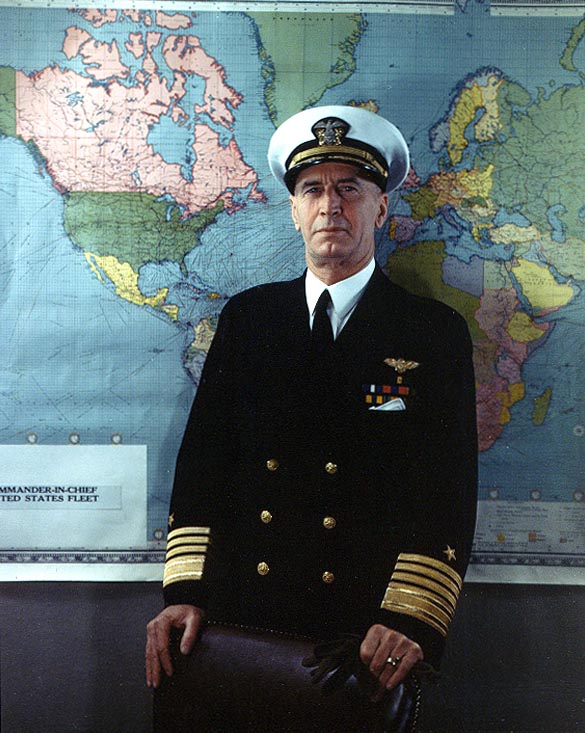Contexto: Any man facing a major decision acts, consciously or otherwise, upon the training and beliefs of a lifetime. This is no less true of a military commander than of a surgeon who, while operating, suddenly encounters an unsuspected complication. In both instances, the men must act immediately, with little time for reflection, and if they are successful in dealing with the unexpected it is upon the basis of past experience and training. As any decisions that I made during World War II sprang from the forty-four years' service that were behind me in 1941, I wish to acquaint the reader with the background of my professional life so that he may better understand their origins.
p. viii
Ernest J. King: Frases em inglês
p. viii
Contexto: War has changed little in principle from the beginning of recorded history. The mechanized warfare of today is only an evolution of the time when men fought with clubs and stones, and its machines are as nothing without the men who invent them, man them and give them life. War is force- force to the utmost- force to make the enemy yield to our own will- to yield because they see their comrades killed and wounded- to yield because their own will to fight is broken. War is men against men. Mechanized war is still men against men, for machines are masses of inert metal without the men who control them- or destroy them.
Excerpt from a late March 1942 memorandum King wrote to President Roosevelt, urging against adopting the policy of those most concerned with defending the continental United States. It is unknown if the memorandum was actually ever seen by the President. The entire memorandum is quoted by Thomas B. Buell in his book Master of Sea Power: A Biography of Fleet Admiral Ernest J. King (1980), p. 193.
/ 1940s
“It must be the key idea of all hands that we will make the best of what we have.”
Excerpt from Atlantic Fleet Confidential Memorandum 2CM-41, sent on 24 March 1941. As quoted in History of United States Naval Operations in World War II, Volume One: The Battle of the Atlantic, September 1939-May 1943 (1948) by Samuel Eliot Morison, p. 52
Fonte: Introduction, p. viii note: 1950s, Fleet Admiral King: A Naval Record (1952)
From King's Foreword in Battle Stations! Your Navy In Action (1946) by Admirals of the U.S. Navy, p. 10
p. 184. Detailing the salvaging of U.S.S. S-51.
p. 236-237.
p. 183-184. Detailing the salvaging of U.S.S. S-51, an operation which King commanded.
From King's Foreword in Battle Stations! Your Navy In Action (1946) by Admirals of the U.S. Navy, p. 9
King's comment after the war on Henry L. Stimson, who was United States Secretary of War during World War II, while speaking to Commander Walter Muir Whitehill, who wrote King's memoirs for him. As quoted in American Warlords: How Roosevelt's High Command Led America To Victory In World War II (2016), p. 473
From King's report on the Japanese attack on the Philippines, as quoted in Battle Stations! Your Navy In Action (1946) by Admirals of the U.S. Navy, p. 180
From King's Foreword in Battle Stations! Your Navy In Action (1946) by Admirals of the U.S. Navy, p. 10
King's first statement as Commander-in-Chief, United States fleet, sent on 24 December 1941. As quoted in History of United States Naval Operations in World War II, Volume Three: The Rising Sun in the Pacific, 1931-April 1942 (1948) by Samuel Eliot Morison, p. 255
“There is work in plenty for all hands- officers and men.”
Excerpt from Atlantic Fleet Confidential Memorandum 2CM-41, sent on 24 March 1941. As quoted in History of United States Naval Operations in World War II, Volume One: The Battle of the Atlantic, September 1939-May 1943 (1948) by Samuel Eliot Morison, p. 52
“SUSPEND ALL OFFENSIVE ACTION. REMAIN ALERT.”
King's final wartime message to Fleet Admiral Chester W. Nimitz, Commander, United States Pacific Fleet, sent by cable on August 14, 1945. As quoted in American Warlords: How Roosevelt's High Command Led America To Victory In World War II (2016), p. 467.
King's public written response to the death of Secretary of the Navy Frank Knox on April 28, 1944, as quoted in Battle Stations! Your Navy In Action (1946) by Admirals of the U.S. Navy, p. 243
“I didn't like the atom bomb or any part of it.”
King's comment to Commander Whitehill on July 4, 1950, which was transcribed in Whitehill's notes. As quoted in The Decision to Use the Atomic Bomb and the Architecture of an American Myth (1995) by Gar Alperovitz, p. 321
Excerpt from Atlantic Fleet Confidential Memorandum 2CM-41, sent on 24 March 1941. As quoted in History of United States Naval Operations in World War II, Volume One: The Battle of the Atlantic, September 1939-May 1943 (1948) by Samuel Eliot Morison, p. 52
“Don't tell them anything. When it's over, tell them who won.”
King's reply when asked for a public relations strategy for the U.S. Navy in World War II. As quoted in Dictionary of Military and Naval Quotations (1966) by Robert Heinl, p. 258
From King's Foreword in Battle Stations! Your Navy In Action (1946) by Admirals of the U.S. Navy, p. 10
From Time magazine's interview with King, Volume XL, Number 23 (December 7, 1942), p. 32.
1940s
Introduction, p. viii
Third Report, p. 195
U.S. Navy at War, 1941-1945: Official Reports to the Secretary of the Navy (1946)
Third Report, p. 174-175
U.S. Navy at War, 1941-1945: Official Reports to the Secretary of the Navy (1946)
